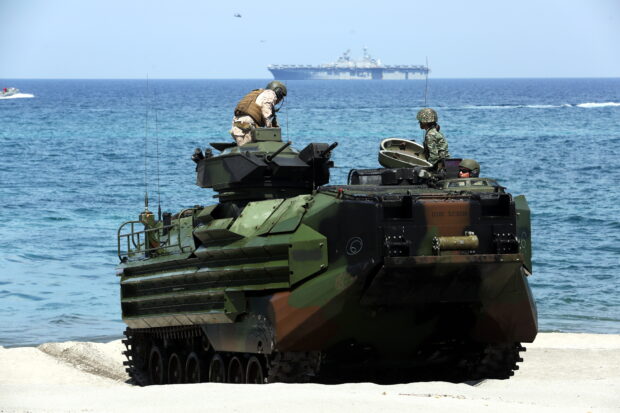
In this photo taken in April 2019, Filipino and American troops storm a beach facing the West Philippine Sea in Zambales during amphibious exercises as part of the “Balikatan” military exercise. (Photo by NIÑO JESUS ORBETA | Philippine Daily Inquirer))
MANILA, Philippines — China’s foreign ministry called the annual war games between the United States and the Philippines a “provocation,” a charge that was dismissed by the Armed Forces of the Philippines (AFP).
“We urge the Philippines to stop making maritime provocations,” Chinese Foreign Ministry Spokesperson Lin Jian said in a regular press briefing on Wednesday.
Lin made the remark in reaction to a report that the Philippines will also conduct joint patrols in the West Philippine Sea with the United States and France as part of the Balikatan (“shoulder-to-shoulder”) exercises for the first time.
Aside from this, Manila and Washington will also sink a mock enemy ship off the coast of Laoag in Ilocos Norte, the northernmost mainland province in the country, relatively near Taiwan.
Taiwan, a self-ruled democratic island that China regards as a renegade province subject to reunification, broke away from the mainland in 1949 following its takeover by Mao Zedong’s communist forces.
China’s sweeping claim
“The Philippines needs to be fully aware that when countries outside the region are brought into the South China Sea to flex muscles and stoke confrontation, tensions could get worse and the region will only become less stable,” Lin said.
“To hand over one’s security to forces outside the region will only lead to greater insecurity and turn oneself into someone else’s chess piece,” he added.
Beijing asserts sovereignty in the entire South China Sea, including most of the West Philippine Sea, even if the Permanent Court of Arbitration in The Hague already invalidated the claim in July 2016 as it rulied from a case filed by Manila in 2013.
PH prerogative
AFP public affairs chief Col. Xerxes Trinidad said in a statement, however, it was the country’s prerogative to conduct such drills, which would have over 16,000 troops from the Philippines and the United States taking part starting next week.
“As a sovereign and independent state, it is the prerogative of the Philippines to engage in activities that contribute to our national security and defense posture,” Trinidad said.
He described the annual war games an “an integral part of our ongoing efforts to develop our territorial defense capabilities and ensure that we can effectively safeguard our sovereignty and territorial integrity.”
“It is focused on strengthening our readiness and resilience in the face of evolving security challenges in our domain and in the region,” he added.

